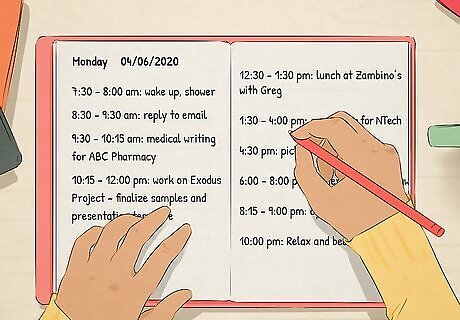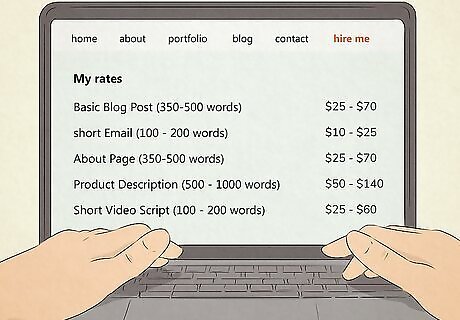
views
Choosing a Focus

Choose a niche so that your business has a clear focus. Identify some general topics that you’d like to write about. If you open yourself up to every single topic, you’re likely to feel overwhelmed. Also, it will take you a lot longer to research articles if you have zero background knowledge on the subject. You can write about a variety of topics, just try to choose fields that relate to each other or that you’re passionate about. Your niche could be something like: Travel Food and beverage Cooking Parenting Marriage Personal finance Fitness

Choose blogging if you want to choose your own topics. There are many different types of freelancing. If true independence is what you're after, blogging is a good place to start. You can create your own blog based on topics that fit in your niche. You can even make it extra specialized. For example, instead of just having a travel blog, you could specialize in writing about off the beaten path road trips to take. Typically, bloggers earn an income by selling advertising space on their site. Blog posts can make a great addition to your portfolio when you’re starting out as a new freelance writer. If you have any particularly popular or successful posts, you can show them to potential clients as samples of your work.

Seek out journalism assignments if you have a knack for covering news. This is a good choice if you don't need an immediate income stream. Instead of writing what you want, you'll need to seek out assignments. Contact editors at news sites, papers, and magazines and pitch your ideas. This is a good choice for freelancers who already have media connections. If you don't have connections, you can still make this work. You just might need to write for a reduced rate or on a trial basis while you make those important connections.

Focus on copywriting if you have a flair for marketing. "Copy" refers to the words used to sell a product or idea. If you are good at persuading people or making a product seem exciting, this is a good route to follow. Consider taking on projects from advertising, marketing, or public relations firms if you want to try copywriting. There are several different copywriting specialties, such as marketing, content, and creative. Talk to experienced copywriters to get a feel for each type of writing.

Explore technical writing if you're great with details. Companies hire technical writers to explain their products and services. Consider technical writing if you already have specific expertise in a field or are a very quick study. You'll need to be able to quickly turn jargon into words that the reader can understand. You can also explore specialized fields such as writing about legal and medical issues.
Developing a Client Base

Build a website to establish your online presence. This will be one of the primary ways that clients can find and learn about your skills. You don’t have to spend a lot of money or be a tech expert to have a great website. You can use a website builder like Squarespace or WordPress. Be prepared to put in some time. You’re not going to build a great website in a day. Your website should introduce yourself, highlight your skills, and include samples of your work. Try to also include testimonials from previous clients. Spend some time looking at other freelancers' websites to get a sense for how great sites are structured.

Create a portfolio to showcase your work. Potential clients will likely want to see samples of your work. Collect some of your best pieces and include them in a portfolio. Make a hard copy of your portfolio for in-person pitches. Build a digital version that you can email to prospective clients. If you’ve already worked as a writer, include some of your pieces that received great feedback. If you’re new to writing, you can write some sample pieces to place in your portfolio. Write about topics that fit the niche you have chosen.

Develop an “elevator pitch” to sell yourself in person. An elevator pitch is a brief (30-second) speech you can use to sell yourself. Come up with a few sentences that you can use to describe your work anytime you are networking. You want to keep it short and to the point to make sure your potential client gets the picture. Your pitch might be, “I’ve recently moved to freelance writing. My specialty is writing about traveling on a budget. I look for lodging and dining options that are excellent, but affordable and off the beaten path. I also love to point readers towards free attractions. Past clients have really loved my thorough research and unique point of view.”

Join a networking group to make new contacts. Look online to see if there are networking groups in your area. Typically, these groups will meet for a happy hour or breakfast meeting about once a month. Attend meetings to get to know other professionals in your area. You can also join a group of professionals from all fields and develop contacts that work for potential clients.

Look for freelance work on a variety of websites to get immediate work. There are numerous sites that help writers find contract work. Do a quick search for freelance writing jobs, and you’ll be off and running. Before you commit to taking a job, read some reviews from other writers who have contracted for that site. You might be asked to provide a resume and writing samples before you’re given a project. Some sites allow you to choose between lengthier assignments that take a few weeks and shorter projects that you can complete in a few hours. Make sure to ask whether you will be paid by the hour or by the assignment. Some popular sites include Upwork, FlexJobs, and Writers Market.

Send pitches to magazines and websites that fit your niche. You might prefer to work for established publications. If that’s the case, you can reach out directly to editors at magazines and websites that pay for articles. For example, if you are a travel writer, you could reach out to a website like Jetsetter. Start by emailing the editor at your chosen publication. Use your written pitch and tell them why you’re a great fit for their publication. You can pitch a specific article idea or indicate that you are available for contract work on any assignment.

Set up a LinkedIn profile to network online. A lot of employers use LinkedIn to look for potential hires. This makes it a great place to make contacts online. Create a profile that highlights your experience and skill set. Make sure to indicate your career goals and the type of projects you would like to work on.
Running a Professional and Productive Business

Find a space to write that is free from distraction. One of the best parts of being a freelancer is the independence. Generally, you’ll be able to work from wherever you want! It’s a good idea to set up an area in your home that is a dedicated workspace. Choose somewhere that is quiet and where other members of your household will know not to bother you. You might use an alcove, a spare bedroom, or a corner of the den as your writing space. Make sure you have all of your necessary supplies, like your computer, notepad, research, and a good source of light. You might decide that you like to get out of the house some days. Choose a coffee shop in your neighborhood that has an ambiance that you like and work there whenever you like.

Develop a regular work schedule. Even though you’re your own boss as a freelancer, it’s still a good idea to develop some kind of routine. Otherwise, it can be tricky to focus on your work that needs to be done. Figure out what time of day works best for you to write and set that time aside each day for work. For example, if you’re a morning person, aim to start work bright and early. If you hit an afternoon slump, you’ll already have gotten your work done for the day. Maybe you work best when your kids are down for a nap. Make sure to devote that time to writing each day. You might want to start out by writing part-time, then gradually increase the hours you spend on it as you get more work. This will give you a chance to figure out a system that works best for you.

Decide on a minimum pay rate. You can choose whether you want to be paid by the hour or by the project. When coming up with a number, consider your experience and expertise. You want to make sure that you are paid enough to make it worth your while, but you shouldn’t ask for a lot more than the going rate. You can get a sense for what other freelancers charge by looking at their websites. Don’t be afraid to negotiate to earn more than what the client initially offers you.

Collect pay upfront to reduce your stress. Many freelancers say that the hardest part of the job is not knowing when they’ll get paid. To save yourself some stress, let your clients know that you expect payment up front. If they don’t want to pay the whole cost, you can at least ask for part of your fee as a retainer.

Track your income to make sure you’re meeting your financial goals. Make a budget of expenses. Keep track of the income you earn from freelance writing. Note the amount you make for each job. If you find you’re not earning enough, try to get more jobs next month. Make sure to set aside money to pay your taxes. As a freelancer, you likely won’t have an employer withholding your wages.




















Comments
0 comment